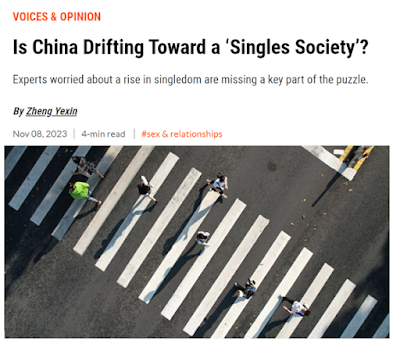Trung Quốc có đang dần trở thành "Xã hội độc thân"?
những chuyên gia lo ngại về tình trạng độc thân gia tăng đang bỏ qua cốt lõi vấn đề.
-----
In much of East Asia, the belief that everyone should get married, preferably at a young age, has deep cultural roots (nguồn gốc văn hóa sâu xa). According to those same norms (chuẩn mực), singledom is often associated with a lonely, empty, even selfish (ích kỷ) existence. Even today, the region’s young singles are frequently stereotyped (khuôn mẫu, định kiến) as overly individualistic (có chủ nghĩa cá nhân) and unwilling to shoulder the responsibilities (san sẻ gánh nặng) of family life.
These beliefs are not always borne out by the data. Although sometimes written off as an urban phenomenon (hiện tượng thành thị) afflicting the over-educated, a close analysis of recent census (điều tra dân số) and survey data suggests this stereotype breaks down once you control for gender and region. Take singles aged 35 to 49, for example. Among males, the share of unmarried persons is highest among those with a primary school education or lower; for women, it peaks (đạt đỉnh) among those with graduate-level educations (giáo dục đại học) or higher.
This gender imbalance can lead to a “marriage squeeze,” (sức ép hôn nhân) in which some people are simply unable to find spouses (bạn đời). Among rural Chinese aged 20 to 49 with a primary school education or lower, there are a staggering (đáng kinh ngạc) 474.5 unmarried men for every 100 unmarried women. In contrast, among unmarried urbanites aged 35 to 49 with a bachelor’s degree or higher, there are just 97.7 men for every 100 women.
It is worth emphasizing here that a large number of young Chinese singles still hold an open attitude towards marriage. They are not too “individualistic” for marriage, as some critics might charge; rather, their individualism shows up as an emphasis on its emotional aspects (khía cạnh cảm xúc). In contrast, much of Chinese society continues to view marriage through largely economic or even demographic lenses (lăng kính nhân khẩu học), with practical calculations and worries over future population growth dominating public discussions of the topic. Entrenched norms (chuẩn mực bảo thủ) about the importance of buying a house and car before marriage or the need to find an economically well-matched spouse only complicate young people’s search for a suitable life partner. The competitiveness (tính cạnh tranh) of the job market and expectation that young professionals commit to overtime also disperses (phân tán) the time and energy that they can spend building their private lives.
In this regard, China is not quite the same as countries where an outright refusal (triệt để từ chối) to marry is prevalent. ...Singles remain a minority (thiểu số), and staying single is often a product of circumstances, rather than individual choice — a phenomenon they call “‘drifting’ into singlehood.”
source: Sixth Tone,



Post a Comment